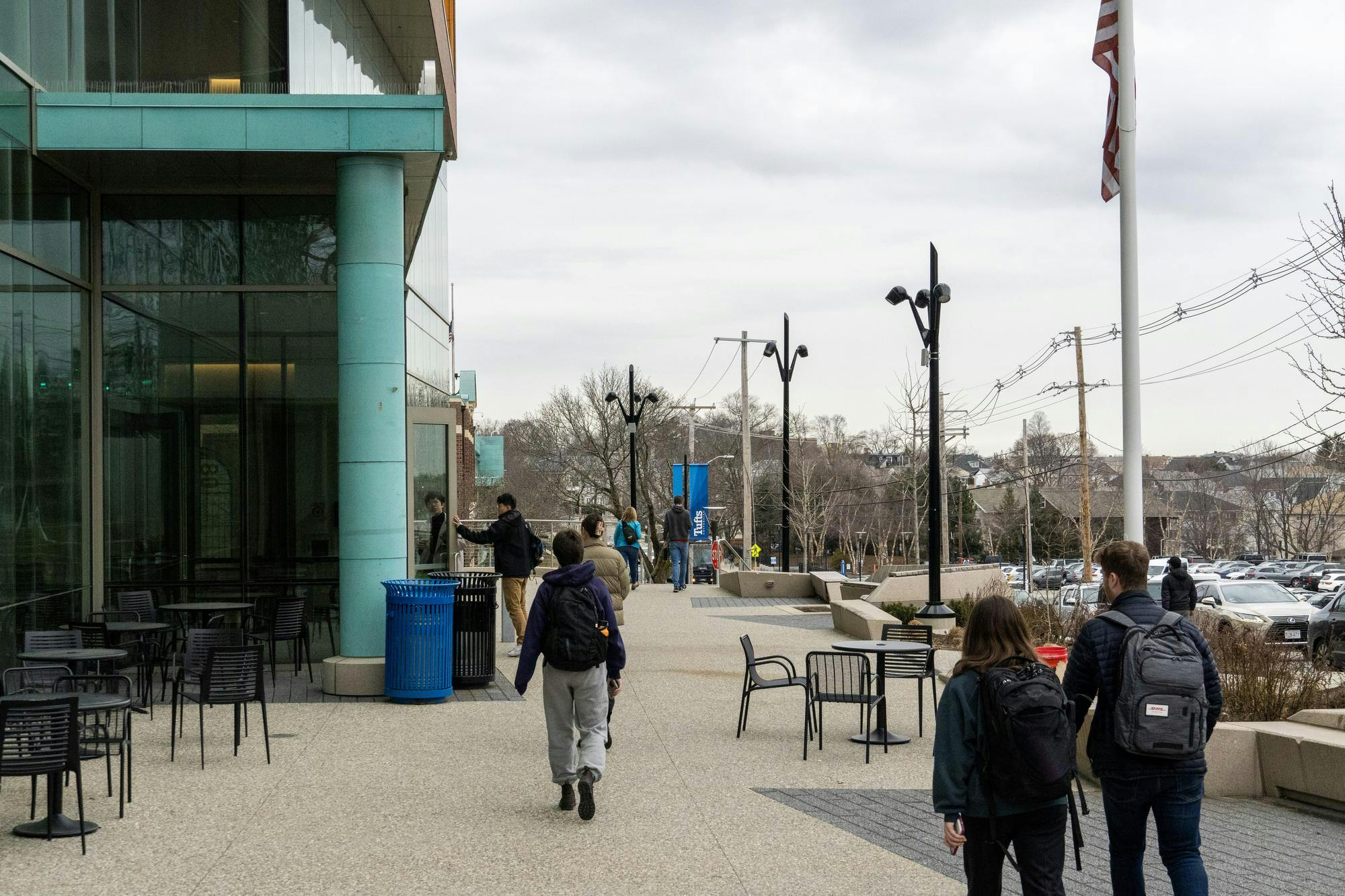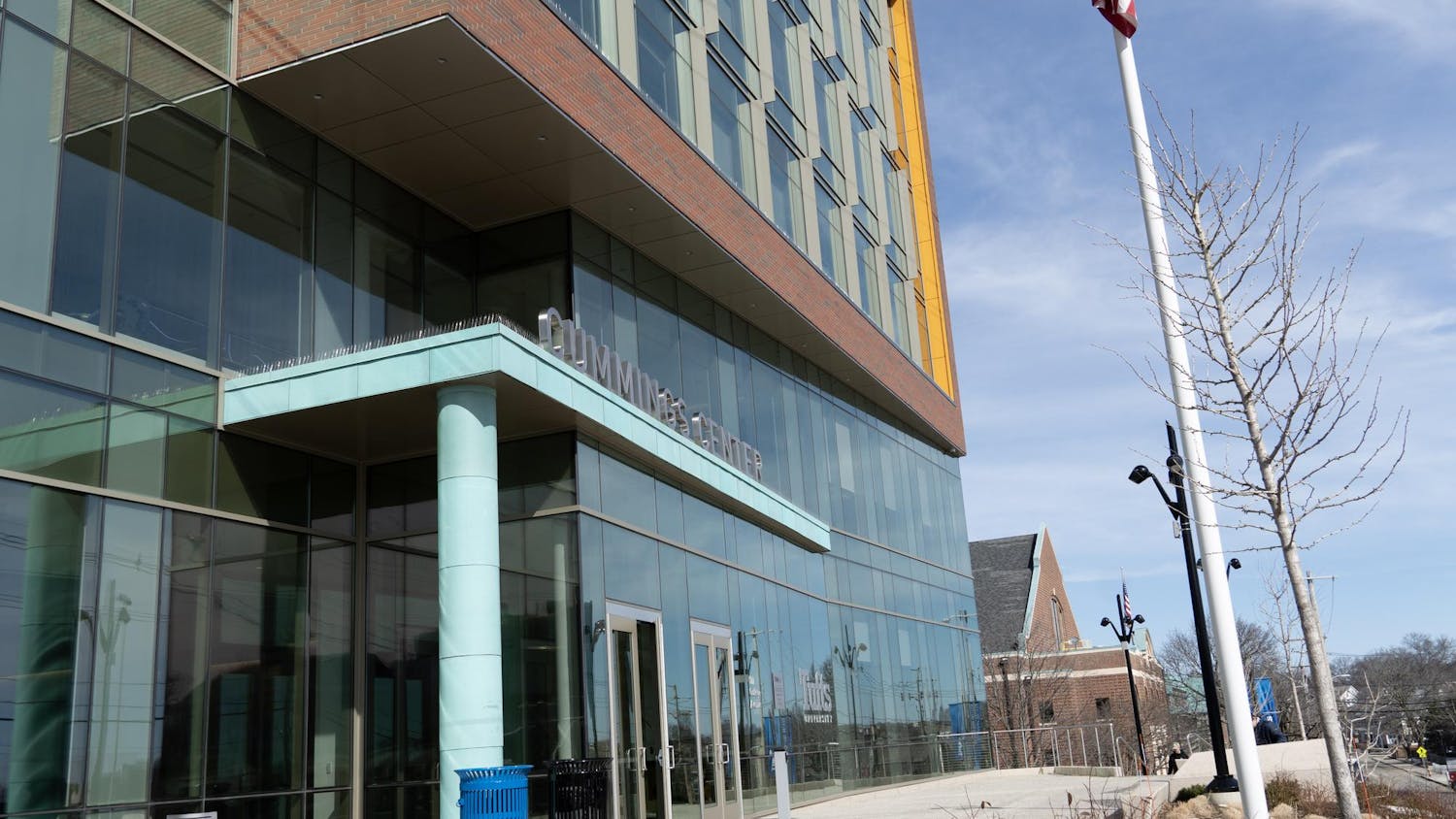On any given weekend morning, small crowds of students can be found waiting outside the Joyce Cummings Center entrance. Why? The building is closed to non-computer science students before 12 p.m. For this demographic, the following behavior is typical: fruitlessly pulling at the door handles, peering into the windows or awkward loitering until someone with the right keycard comes along.
Unless your CS course gives you keycard access, the Cummings Center and its classroom doors are locked before 12 p.m. on weekends and 8 a.m. on weekdays — but that’s soon to change with an upcoming pilot program.
It was before 10 a.m. on a Saturday last month when student Romy Arie — operations director of the Tufts University Model United Nations team — had to call the Tufts University Police Department’s non-emergency line in order to unlock the doors of the Cummings Center room she had booked for the group’s annual conference.
She arrived to a crowd of students waiting outside the building. Thankfully, Romy said, one of MUN’s members is a CS major who was able to let students in. They then had an MUN advisor stand by the door to let the rest in as they arrived. “So we kind of managed to solve it pretty quickly, independently,” she said.
The process, though, slowed down the timing of the conference which ended up starting late. “It’s just frustrating,” Romy said, “especially because they knew that I had reservations in there.”
Even on a regular morning, students seem to feel a similar level of irritation not being able to access the Cummings Center. After waiting outside the building on Saturday morning, junior Max O'Reilly said he felt “confusion and frustration.”
O'Reilly wondered why the building isn’t open earlier on Saturdays. “I see no reason why it shouldn't be. I think every other academic building that people can study in — like Tisch and the SEC — are also open at this time, so I don't see why this space also isn’t open.”
According to Director of Academic Space Management Bruce Panilaitis, the exception to the policy is the need of computer science students “that take classes that require the Linux labs … computer labs that have specific operating systems in the JCC,” to have access to the building at all times.
“It’s an academic building. They don’t hold classes on the weekend,” Panilaitis said. “And so, the question is, what is the need for it to be open? I understand the desire. It’s a cool space to hang out and be around other friends, but there are other spaces available.”
While there are other places to study, Nick Leon, a sophomore who arrived at the Cummings Center around 11:30 a.m., said she would still prefer that the building be open earlier. “It’s like the biggest building on campus, it has the most study spaces, and I hate Tisch so I’d rather study here if I could get in,” she said.
The major obstacle preventing an expansion of opening hours, Panilaitis said, is staffing. He said that late night and early morning shifts are the ones student workers cancel most commonly.
In addition to staffing, there are budgeting concerns with messes and furniture damage caused late at night. Panilaitis said he noticed “people are a little less concerned about having oversight from either a staff member, faculty or anyone else in the building and people are a little bit more free with their behavior.”
Taking into account the concerns of Panilaitis and Associate Dean of Students Kevin Kraft, Tufts Community Union Senators Varun Nagpal and Anand Patil have been working since October to expand Cummings Center hours as a part of Nagpal’s fall campaign promise.
Their pilot program, starting April 1, will dedicate TCU funding toward hiring Cummings Center staff for extended hours for the entire month, leading into exam season.
The pilot program will extend all student Cummings Center access hours by three hours on weekdays and six hours on weekends, costing TCU $30 per additional hour and a total of $3,310 for the full 29 days of the program. The new schedule would be: 8 a.m. to 2 a.m. Monday through Thursday, 8 a.m. to 11 p.m. on Friday, 9 a.m. to 11 p.m. on Saturday, and 9 a.m. to 2 a.m. on Sunday.
According to Patil and Nagpal, there are two key questions about the effect of extended hours that the pilot program will test and that will ultimately decide whether the academic space management team is able to increase funding for additional staffing.
The first thing the pilot will look for is whether people will frequent the Cummings Center enough during current off hours to make the extra budget worth it. “What’s the uptick when it comes to students using the JCC? … Are we reaching the critical mass where it's actually necessary?” Nagpal said.
The second question is whether the student response to the increased number of people in the Cummings Center would resolve the building management’s concern about building upkeep. “Will more students in the building equal more shenanigans, or will more students productively working and studying … actually decrease the likelihood that someone will go against the social norm?” Patil said.
The initiative will also monitor occupancy counts in Tisch Library and the Mayer Campus Center during the month of April and offer students an opportunity to voice feedback via a Qualtrics survey.
Getting successful metrics out of the pilot program would be a significant step in the academic space management team’s ability to obtain the budget for extra staffing; Patil said: “They need to prove that there’s some success.”
“The answer isn’t completely ‘no,’ it’s how do we make things happen that are appropriate, are staffed and make some sense programmatically,” Panilaitis said about the possibility of extended hours.






